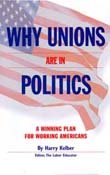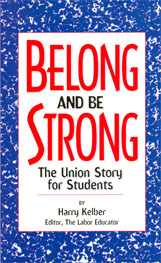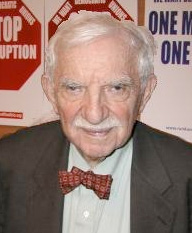What Should Organized Labor Expect
If Obama Wins the Presidency in 2012?
By Harry Kelber, LaborTalk
February 27,2012
If President Obama, as predicted, wins his election for a second term as President of the United States, he will be less beholden to American labor for his victory than for his first election in 2008.
In 2008, he hungered for the financial support and army of volunteers that the unions freely gave him. He desperately needed unions to help him carry the key industrial states that assured his election as president.
President Obama did very little to express his appreciation for labor's support, except in an occasional speech. He forgot his promise to press for passage of the Employee Free Choice Act (EFCA) within 100 days of his election. AFL-CIO unions, under heavy attack, were counting on EFCA to "level the playing field between labor and management."
Obama also used his official powers to persuade the unions to hold off their campaign to amend his health care legislation much to the chagrin of many of his supporters. He went ahead with his Free Trade Agreements with South Korea, Colombia and Panama, which he knew were vigorously opposed by organized labor as job-cutting measures.
Obama disregarded his promise to raise the federal minimum wage, still stuck at $7.25 an hour, knowing that millions of low-wage workers were struggling to support families at that pitiful wage -- and even lower.
Throughout his first term, Obama continued to rely on Wall Street financiers and Washington insiders as top advisors, despite his promise to bring experts to the White House who were more in tune with Main Street needs.
Will Obama, in his Second Term, Be More Sympathetic to Unions?
Depending on how the 2012 campaign develops, Obama may still need the full-fledged support of labor to defeat the Republican candidate on issues. But what is he willing to pay for it? Not much -- certainly not an EFCA to make unions stronger. Obama is still clinging to his Wall Street-trained advisers and is looking for big-time corporate donors, no matter what their views.
Obama's advisers fully understand labor's predicament. Unions would be further weakened with a Republican in the White House. Realistically, they have no place to go, except to work for Obama's re-election in tandem with the Democratic Party.
It is unlikely that Obama will recommend another financial stimulus package to create new jobs for the millions who will still be unemployed, even as the economy picks up. Obama has been sold on the idea that cutting the size of the federal budget is his top priority, although he will continue to talk about the jobs his administration has created with his frequent coda: "...and there's much more to be done."
Obama says he wants to cut four trillion dollars from the federal deficit. That means the elimination or crippling of hundreds of current programs that serve as survival networks for the poor, the retired, the sick and the elderly. He hasn't told us where and how he plans to do the cutting.
* * * *
What can organized labor do about its dilemma? It can start to build its own independent political voice, divorced from both Democrats and Republicans. With some 16 million members in its ranks in cities and towns across the country, it represents, potentially, a powerful political force that can criticize or support the Obama administration, whenever it so decides. It need not yield to the pressure to make Obama's second-term victory into a coronation.
About two months ago, AFL-CIO President Richard Trumka agreed to build an independent voice for labor. He concedes that is what union members are asking for. So why the delay?
About the Labor Educator
Harry Kelber, author of the series of The Labor Educator booklets, has served the labor movement for more than seven decades as a journalist, organizer, educator and constructive critic. For decades, international unions and hundreds of locals and labor councils have used The Labor Educator publications to educate members and the public and to facilitate organizing and political action. The most popular booklets have been "Why Unions Are in Politics," "Why Unions Are Good For You and Your Family ," "Por Que Los Sindicatos Son Buenos Para Usted Y Su Familia" and "Belong and Be Strong: The Union Story for Students."
Place your order for these low-cost booklets and help build a more informed and involved membership. Each easy-to-read booklet contains irrefutable facts and useful information that the union-bashers don't want the public and workers of all professions to know or think about. The booklets are powerful educational and organizational tools that can help those who believe in social and economic justice make their case why America needs a strong, vibrant labor movement.
Each week, The Labor Educator publishes LaborTalk and The World of Labor by Harry Kelber on the Internet and sends them out to subscribers via email. These columns are posted on two web sites: LaborEducator.org and LaborsVoiceForChange.org. For free subscriptions send an email to info@LaborEducator.org with the word "Subscribe" in the subject line.
An Outstanding Resource: See CorporateCampaign.org
An outstanding resource on the Internet that can be useful to help unions "think strategically, fight smart and win," is www.CorporateCampaign.org. Be sure to check out the "Campaigns" section.






